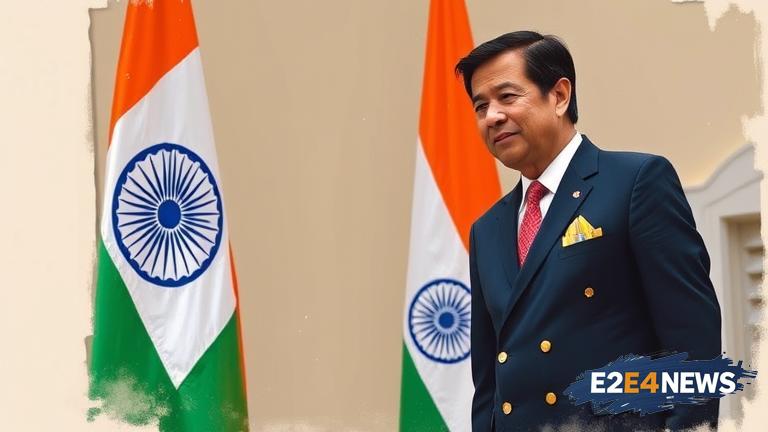In a move aimed at bolstering economic and strategic cooperation, Philippines President Ferdinand Marcos Jr. will embark on a four-day visit to India from August 4-8. This historic trip is expected to pave the way for enhanced bilateral ties between the two countries. During his visit, President Marcos will hold bilateral talks with Indian Prime Minister Narendra Modi, focusing on key areas such as trade, investment, defense, and security. The two leaders are likely to discuss ways to strengthen their nations’ partnership in the Indo-Pacific region, a vital geopolitical hotspot. President Marcos’s visit is also seen as an opportunity for India to expand its footprint in Southeast Asia, a region of growing economic and strategic importance. The Philippines, with its strategic location, is poised to play a crucial role in India’s Act East policy. The visit will also provide a platform for the two countries to explore new avenues for cooperation in areas such as agriculture, infrastructure development, and renewable energy. Furthermore, the two nations are expected to sign several agreements and memoranda of understanding (MoUs) during the visit, aimed at promoting mutual understanding and cooperation. The Philippines and India have a long-standing relationship, with diplomatic ties dating back to 1949. However, in recent years, the two countries have been working to strengthen their partnership, driven by a shared desire to promote peace, stability, and prosperity in the region. President Marcos’s visit is a testament to the growing importance of the India-Philippines relationship, which is expected to have far-reaching implications for the region. The visit will also provide an opportunity for the two countries to discuss regional and global issues, including counter-terrorism, maritime security, and climate change. In addition, the two leaders are likely to explore ways to promote people-to-people exchanges, including education, culture, and tourism. The Philippines is one of the fastest-growing economies in Southeast Asia, and India is keen to tap into its vast potential. With a growing middle class and a strategic location, the Philippines offers immense opportunities for Indian businesses and investors. The visit is also expected to boost tourism between the two countries, with India being a popular destination for Filipino tourists. Moreover, the two countries are likely to discuss ways to enhance their cooperation in the field of defense and security, including joint exercises and training programs. The visit will also provide an opportunity for the two countries to promote their respective cultures, with a focus on exchanging ideas, traditions, and values. Overall, President Marcos’s visit to India is a significant development in the India-Philippines relationship, marking a new era of cooperation and friendship between the two nations. The visit is expected to have a positive impact on the region, promoting peace, stability, and prosperity. As the two countries move forward, they are likely to face several challenges, including the need to balance their relationships with other regional powers. However, with a strong foundation of mutual trust and cooperation, the India-Philippines relationship is poised to overcome these challenges and emerge as a key partnership in the region. In conclusion, President Marcos’s visit to India is a historic milestone in the India-Philippines relationship, marking a new era of cooperation and friendship between the two nations.





